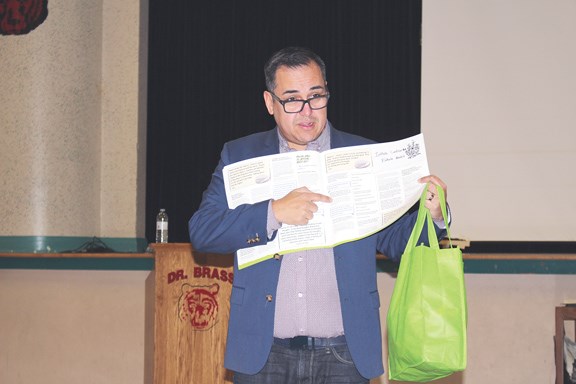For Corey O’Soup, speaking at Dr. Brass School last Wednesday was sort of a homecoming.
O’Soup, Saskatchewan’s new Advocate for Children and Youth, told the assembly of students at the school that he attended classes at Dr. Brass in Grade 2.
Or, at least O’Soup, attending the Dr. Brass Bears Love Yourself Day, said he was at the school for a short while. In his Grade 2 year, he related, he attended classes at six different schools.
It was part of an upbringing O’Soup said was not always easy.
It was often a case of an empty refrigerator at home, and that meant going to school many days without lunch. But O’Soup said he wouldn’t admit to not having a lunch, instead masking the situation by telling others he didn’t like lunch.
“Even today it’s hard for me to eat lunch,” he said.
And supper was only marginally better, with macaroni and tomato soup on the table five or six nights a week.
“I could tell when mom and dad had some money there were wieners … chopped up into the soup,” said O’Soup.
While food was often scarce, O’Soup said his parents did have a vision for their children.
“One of the most important things they taught me was about education, about going to school,” he said. “For five, or six years I had perfect attendance … They (mom and dad) made me get up, made me go to school.”
At the time O’Soup said he would have rather slept in but “now I’m really thankful for it …That childhood really shaped who I today,”
O’Soup told the students that their time in school is a building block.
“Education is something that is really important,” he said.
For O’Soup making sure youth have the opportunity to an education is just one of his responsibilities of his provincial role. He said his role is essentially about ensuring the safety of more than 300,000 youth in Saskatchewan.
While there are basic human rights, such as the right to food and water, O’Soup said children have a number of additional specific rights as laid out in the United Nations Convention on the Rights of a Child, a document signed by all UN nations except the United States.
O’Soup said his office is there to ensure the rights of youth are protected, so if a young person thinks “something is happening they don’t think it right,” they can contact his office.
“Someone in the province is standing up for you and your rights.”
One effort to help youth which O’Soup has already been involved with is talking with more than 1000 youth in Saskatchewan’s north to learn firsthand about their issues and concerns.
“I was told about some really difficult situations,” he said, adding of the more than 300 who offered up their personal stories the biggest concern was “they told me they’re sad.”
That sadness comes from many things, but topping the list is that many feel they are bullied.
When O’Soup asked if students in the assembly thought they have ever been bullied, most hands went up.
“Bullying is different than it used to be,” said O’Soup. He noted when he was a kid he could find safety at home, but today bullying can follow a youngster home as it takes place through various social media.
“You can’t get rid of it. It’s worse than when I was a kid,” he said.
And while O’Soup said he was pushed into lockers and had his running shoes taken, the stories today suggest it’s a rougher bullying taking place too.
“Bullying is getting way more violent and aggressive than they used to be,” he said.
And, the ‘voices’ from youth in the province’s north also told stories that not all bullying comes from peers. Adults such as teachers and RCMP officers were also talked of as aggressors at times.
“It’s not just kids bullying kids anymore,” said O’Soup.
That said O’Soup said in most cases when bullying is taking place children should talk to an adult; parent, teacher, the police, but added they can contact his office as well if they need help.
The report, now complete, is one O’Soup said he wants to see action taken on.
“I promised these kids the report would not gather dust on a shelf, that something would be happen,” he said, adding copies are with the Premier, the Prime Minister and he soon heads to Columbia to talk about the findings.
O’Soup said there are a number of calls for action resulting from the report, and he said while the provincial government has accepted the document, he hopes now that the new premier and cabinet are in place that specific actions will move forward.



